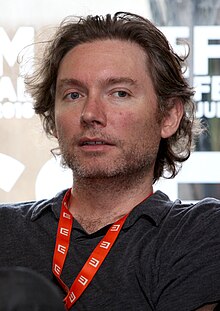Kevin MacDonald (director)
| Kevin Macdonald | |
|---|---|

Kevin Macdonald in 2010
|
|
| Born |
28 October 1967 Glasgow, Scotland, United Kingdom |
| Residence | North London, England |
| Occupation | Film director |
| Years active | 1994–present |
| Spouse(s) | Tatiana Lund (1999–present) |
| Children | 3 |
Kevin Macdonald (born 28 October 1967) is a Scottish director. His films include a documentary about the 1972 murder of 11 Israeli athletes, One Day in September (1999), the climbing documentary Touching the Void (2003), the drama The Last King of Scotland (2006), the political thriller State of Play (2009), the Bob Marley documentary Marley (2012) and is in progress of making the Whitney Houston documentary, which is due to be released theatrically in 2017.
Macdonald was born in Glasgow, Scotland. His maternal grandparents were English actress Wendy Orme and Hungarian-born British filmmaker Emeric Pressburger. He was brought up on a sheep farm in , Dunbartonshire. He was educated at Glenalmond College, and St Anne's College, Oxford. His brother Andrew is a film producer.
In 1999, he married Tatiana Lund, with whom he has three sons, and lives in North London.
He began his career with a biography of his grandfather, The Life and Death of a Screenwriter (1994), which he turned into the documentary The Making of an Englishman (1995).
After making a series of biographical documentaries, Macdonald directed One Day in September (1999), about the murder of Israeli athletes at the 1972 Munich Olympics. Possibly the most striking feature of this film was the lengthy interview with Jamal Al-Gashey, the last known survivor of the Munich terrorists (it has been suggested recently in Aaron Klein's book Striking Back that another, Mohammed Safady, might also still be alive). Macdonald found Al-Gashey through intermediaries, and was able to convince him that the film would only be truly authentic if Al-Gashey gave his side of the story. Since the former terrorist was convinced that Israeli authorities were still hunting him (he had been in hiding ever since being ransomed for a hijacked aeroplane less than two months after the Munich massacre), Al-Gashey agreed to the interview only on condition that he would be disguised, his face would be shown only in shadow or blurred out, and that the interview would be conducted by a person and in a place of Al-Gashey's choosing (which turned out to be Amman, Jordan), although Al-Gashey agreed that Macdonald could be present. Since the interview was conducted entirely in Arabic (even though Al-Gashey was known to be fluent in English, having been interviewed in the language in 1972), and Al-Gashey (through paranoia or annoyance) frequently stormed out of the interview room, Macdonald did not know if he had anything usable until he returned to London and hired an Arabic translator. The results spoke for themselves – the film won an Oscar for Best Documentary.
...
Wikipedia
